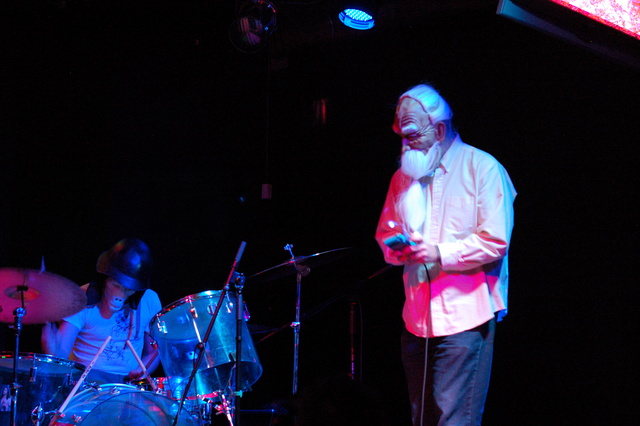The concept is straightforward, if a bit unusual. For its latest release, Brujas , Albuquerque noise emitters cobra//group and countless other musicians recorded 10 hours of music in the dark. They went to a handful of abandoned buildings in Albuquerque and Corrales, turned out the lights and played. The group invited friends to participate in the sessions, but no one knows how many people showed up. People were allowed to enter quietly and leave whenever they wanted to.After recording was complete, the core (which includes Jonathan Cram of BoneTar; the Alibi’s Marisa Demarco of Ya Ya Boom; Fando’s Mike Day; Alchemical Burn’s Ken Cornell; Jessica Billey and Bud Melvin of Grave of Nobody’s Darling; and Raven Chacon) took turns anonymously editing the mix. When it had been boiled down, about an hour-and-a-half of music made the cut.The tracks are expectedly eerie, but there is a startling amount of tranquility interspersed with sharp jolts of aggravation and dissonance. In this interview, a project member prefers to remain nameless, in keeping with the anonymity of the recording process. (It’s not Demarco.) He/she gives us a peek inside the making of the record. Why record in the dark? A lot of us are interested in playing in a large group and blending into a big situation. I think playing in the dark battles some kind of shyness. It’s an opportunity to take experimentation to another level because you’re not concerned about anything visual that’s happening. You can pick up an instrument and just start playing. You get this other kind of confidence that kicks in. What was involved in making sure you captured the sound you wanted? Depending on the site, we would usually go in and set up 10 microphones per room. At one place, we set up a pirate radio rig and broadcast what we were playing. You could actually hear yourself being amplified from inside the room. Did the recording situation influence what instruments you used? Yeah. We used a lot of acoustic stuff. Acoustic guitars, violins, a banjo, accordions, and one space had a piano. Sometimes we used electric instruments, but they had minimal effects on them. What surprised you most? It would be strange when all you could hear were three people. Then, all of a sudden, you would hear what sounded like 10 different people in the room at once. What do you think the most misunderstood thing about noise music is? Some people think we’re trying to induce pain or be annoying. They also think we don’t rehearse, and that’s not true. It might not be the way you rehearse a song, but there’s a procedure set up, and we’re not necessarily trying to cause a racket. Has the genre changed at all over the years? It’s not as academic as it was in the past. Now it’s more like lowbrow experimentation, where a bunch of kids get together and make loud sounds. What’s your take on the noise scene in Albuquerque? It’s becoming the regional hub of noise. There’s not really much going on in Phoenix or West Texas. It’s a destination for touring bands, and it’s definitely growing. How would you describe a noise concert to someone who’s never been to one? When you go to a good one, it’s like the best basement punk show or metal show. It can get rowdy, and you’re amazed by what you’re listening to because you’re hearing a bunch of notes at once. The volume really hits you physically. What are you guys gonna do at the release party? Without giving too much away, I can say that we plan to recreate these sessions during the show.
cobra//group will wreak havoc on the Albuquerque Center for Peace and Justice on Friday, May 16, at 8:30 p.m. Yoda's House and William Fowler Collins will also get on stage.Listen to the dark at www.myspace.com/cobragroup.










